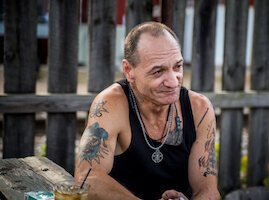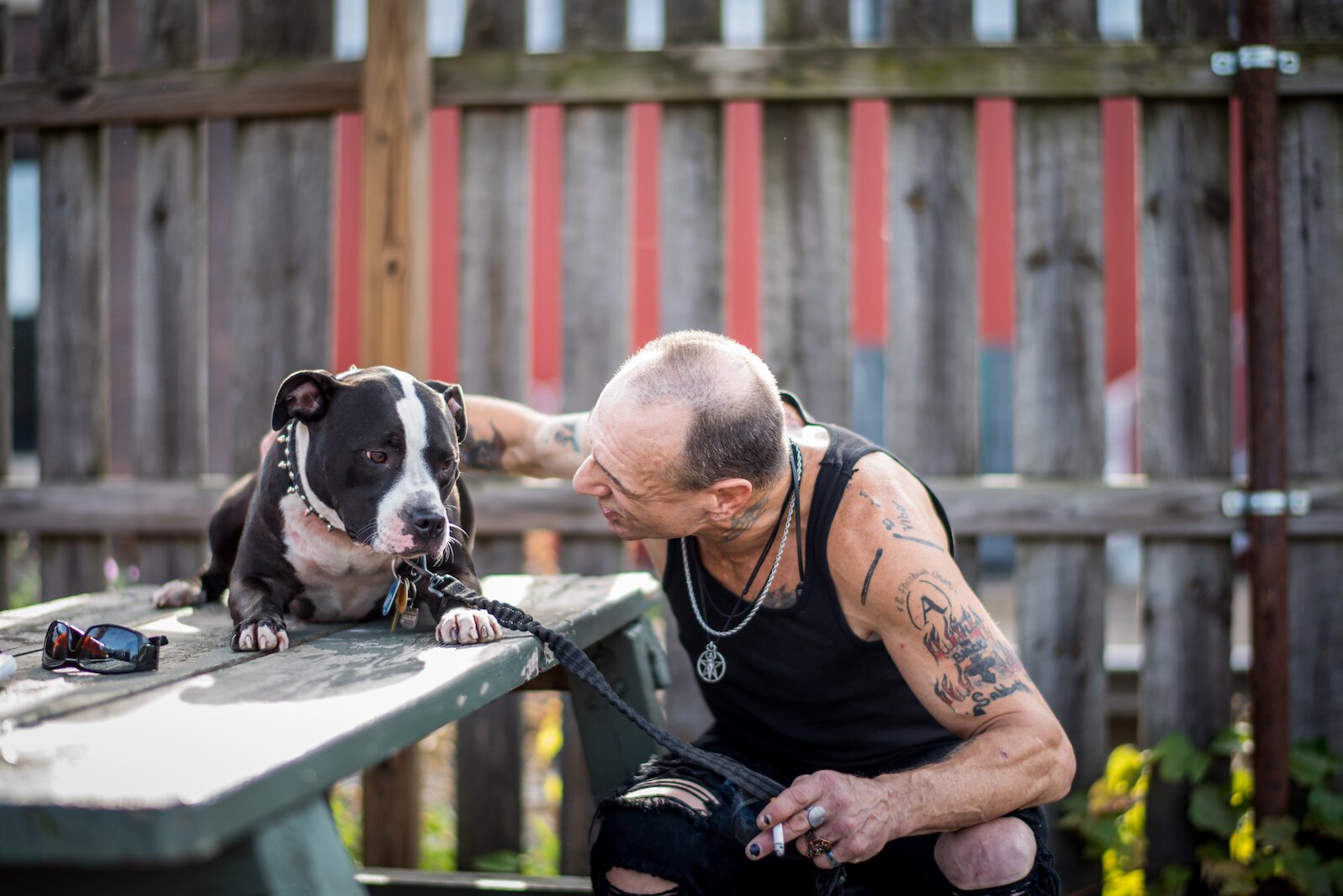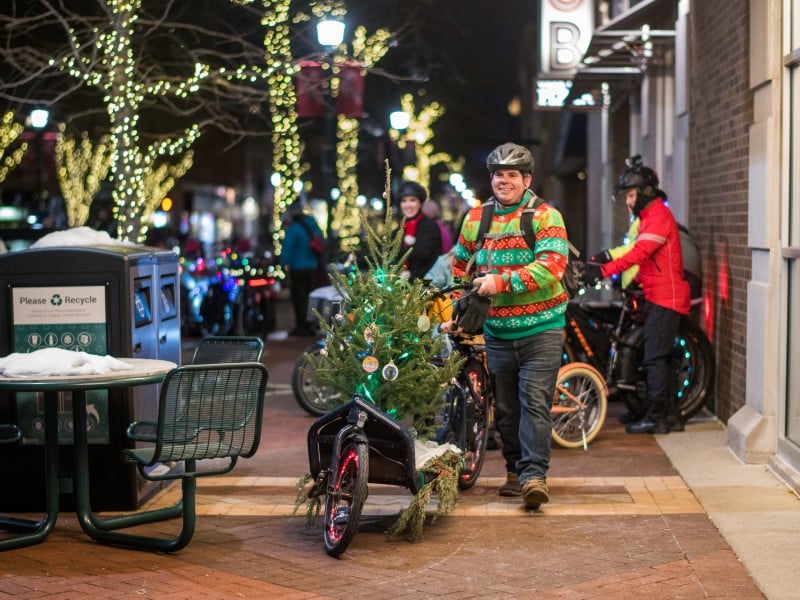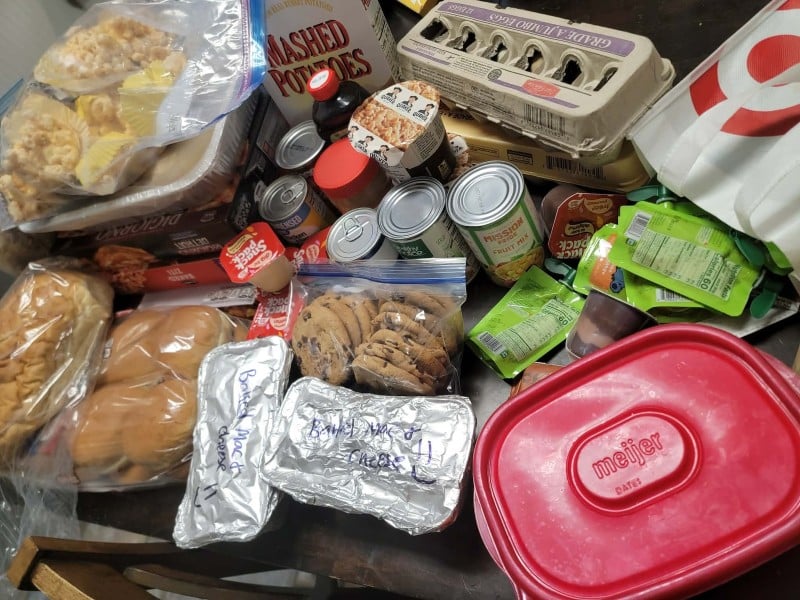This story is part of Southwest Michigan Second Wave’s series on solutions to affordable housing and housing the unhoused. It is made possible by a coalition of funders including the City of Kalamazoo, Kalamazoo County, the ENNA Foundation, and LISC.
Yancy Barrett is doing it all for Remy.
Remy is a boisterous pitbull, built like a cinderblock on legs. She seems to love everybody and will slam herself, licking and slobbering, happily into most people she meets.
If someone acts aggressive towards Barrett, she’ll turn into something scary, he says. But it’s hard to believe the goofy dog could be vicious.
Because of Remy, Barrett is keeping himself off of drugs, and doing what he can to keep his and Remy’s apartment in Vine.
“You’re not a homeless dog anymore, baby. You’re all fattened up, groomed,” he tells Remy.
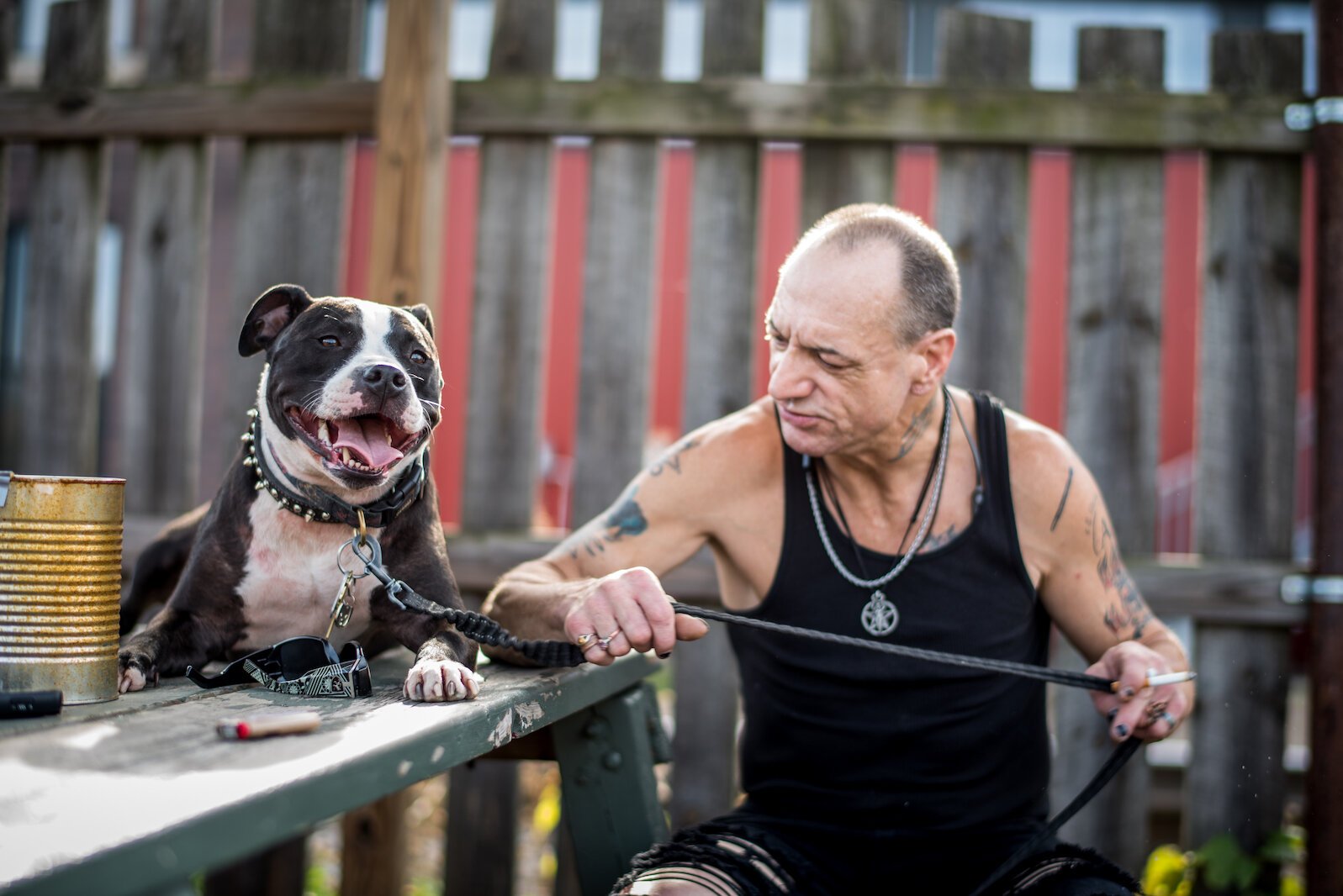
“I didn’t know my dog was going to carry me up out of the rut,” he says. Barrett had been homeless for about 12 years before getting his apartment — the second one he’s had in his 54-year life — in May.
How does it feel to finally have some stability?
“I think about stability,” he says as if the stability he feels now could vanish at any moment. He cuts himself off, and says of his former life, it felt “like blood out of an open wound.”
He wants a home for Remy. And Remy, in a way, is responsible for Barrett getting a home. Because of Remy, he met Meg Forrest, who he now jokingly calls “Mom.”
We talked with Barrett and Forest in the Old Dog Tavern courtyard, as Remy ran around smelling everything.

Forrest, a volunteer helping Kalamazoo’s homeless, speaks about the people she’s tried to help find shelter, but Barrett interrupts.
“I’ll forever be in her debt, I’ll never be able to repay her, ever–“
Once Barrett starts talking, he tends to keep going. She holds up her hand, makes a “Tchss, tchsst, tchsst!” noise to stop him.
“Oh, look at that,” he says adoringly. “I love it.”
Forrest continues what she was saying, that the people living on the streets and in tents have grown very frustrated with many of the official routes intended to help them get off the streets.
The housing voucher system is a prime example. When it takes months to wait for a housing voucher after going through a long application process and then having to re-apply to get the actual voucher and housing — it’s a two-stage process, Forrest explains — people tend to get frustrated and angry. They’ve been hearing about the promises of real shelter, but have to jump through many hoops to see if they can be approved for that shelter.
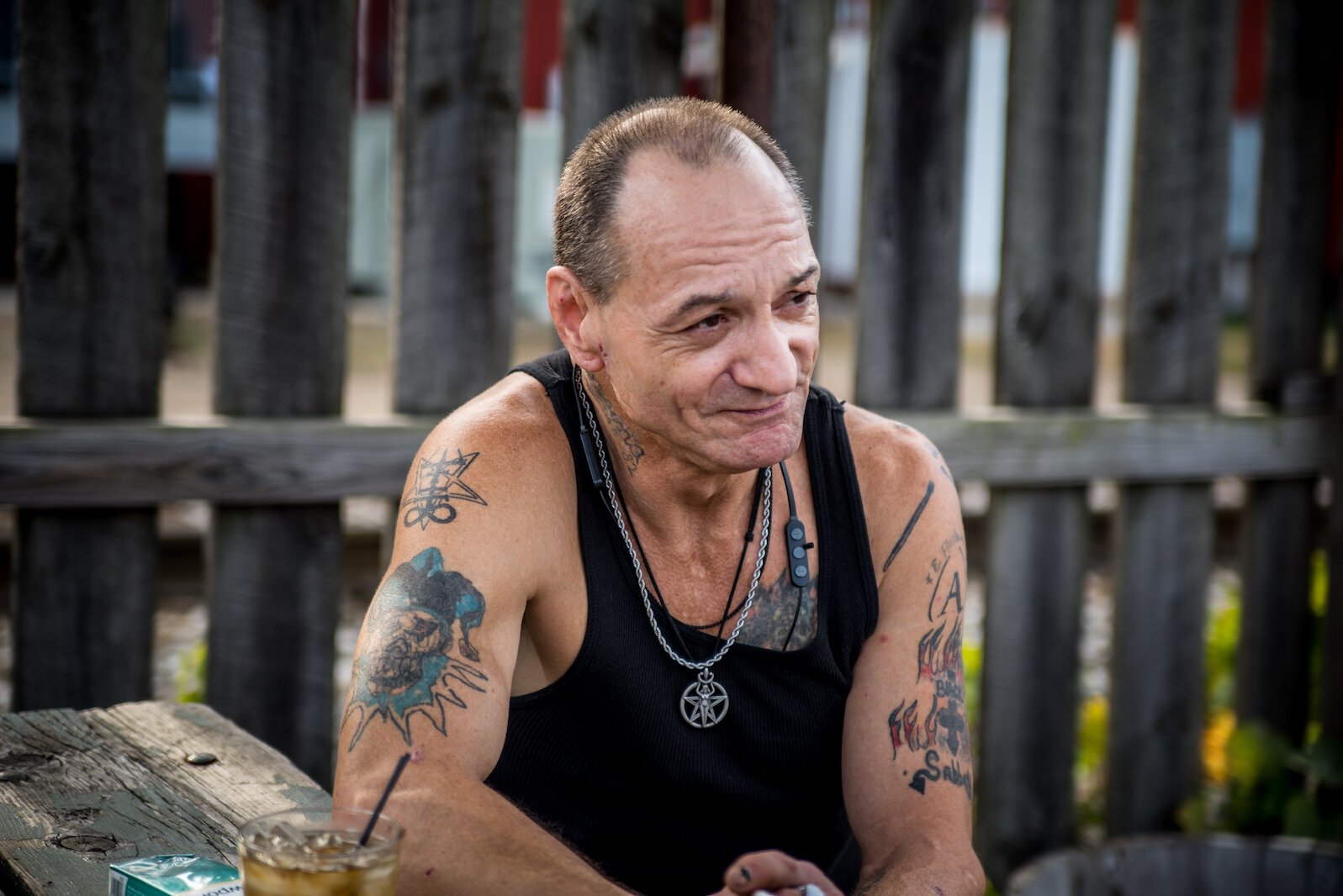
“What I think is, they don’t feel like they get support from the caseworkers, and it’s not like the caseworkers are necessarily doing a bad job,” Forrest says. “I think they are so overwhelmed. I have Yancy, and they have a hundred Yancys.”
She’s been helping maybe six people apply for vouchers, with varying degrees of success. She helps them get IDs, to fill out all the forms to get on the voucher list, “then they end up going to HRI and it’s like three months,” she says. If someone’s living in a tent, watching winter coming in on the horizon, waiting for three months makes them feel like they’ve been forgotten.
“With him (Barrett), when we got close to getting the apartment, I was calling Pine Grove (Housing Service), I was calling HRI, I was calling the apartment place every day.”
Volunteer for dogs, volunteer for the dogs’ people
Forrest says she “kinda fell into this.”
Forrest never thought she’d be an advocate for unsheltered people. She’s a dog lover who owns and runs Bark Park, a dog day-camp in Portage.

Last year her church, St. Luke’s Episcopal, hosted a Christmas dinner for the homeless. She volunteered to help and saw that many of the people attending had dogs.
She began helping people get their dogs food, vet care, to get them licensed and vaccinated. Last year the canine parvovirus was running rampant through the Kalamazoo homeless community.
Then the dogs’ people would ask her for help, she says. They’d tell her, “I have this situation, can you help me with this?”
Often, situations centered on getting housing vouchers. Many qualify, yet due to their various issues — from a lack of ID to mental disabilities — they find it impossible to jump through the many bureaucratic hoops on their own. “Okay, let me try to figure it out,” she told people.
In early 2022, she met Barrett. The weather was freezing. She noticed that he’d taken off his own coat to put on his dog.
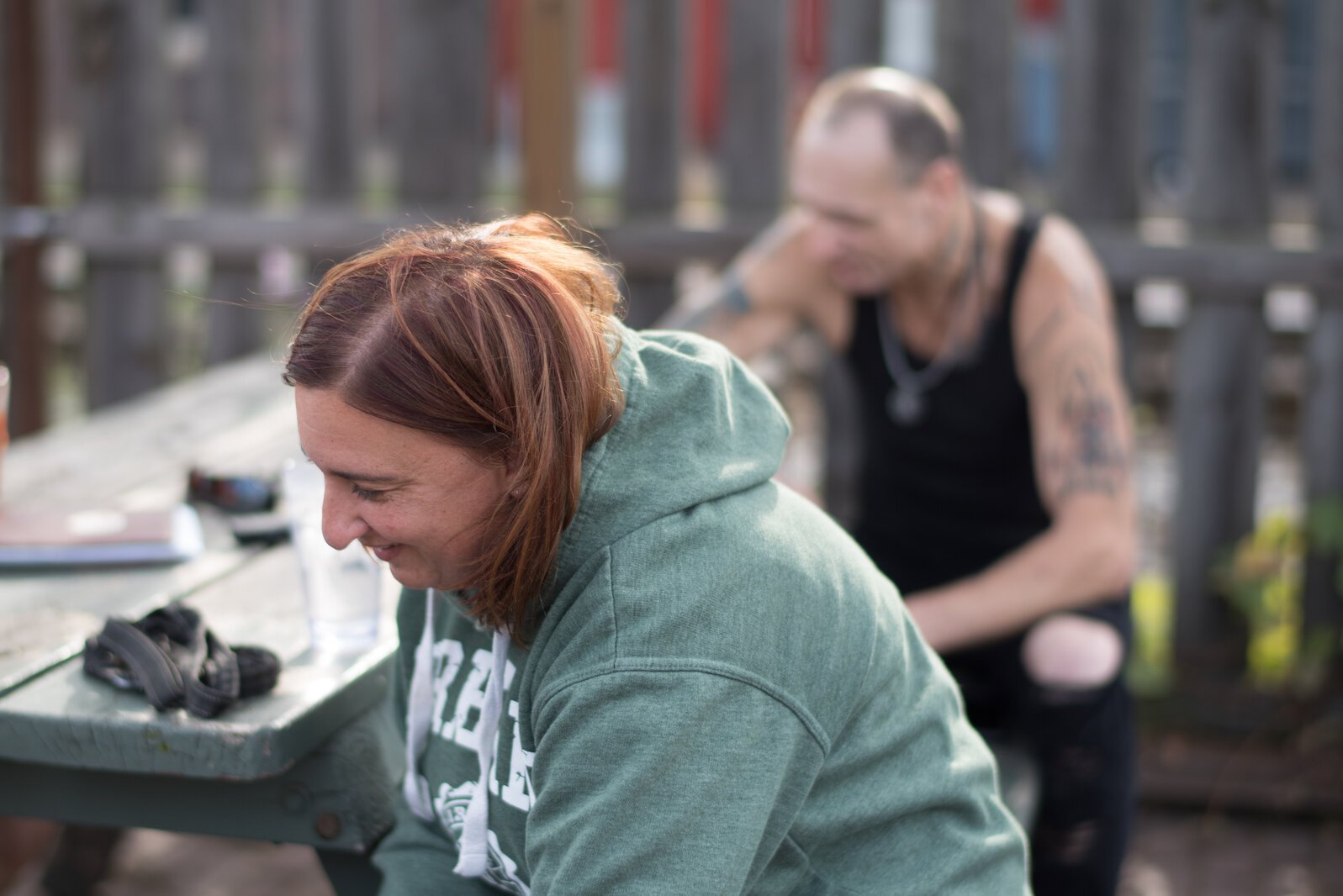
Being a dog person on a mission to help both animals and people, she was prepared with dog-sized cold weather vests.
Barrett was amazed that this stranger asked him, “You want a vest for your dog?” He said, “Well, yeah! I can get my coat back! It was cold.”
Soon after this meeting where they talked about coats, Barrett vanished. There was a rumor he’d died, taken by the Kalamazoo River.
Barrett was sheltering under the East Michigan bridge by Rose Park Veterans Memorial when the river flooded. “I watched the water rise up between two tents,” he says. He grabbed his essentials and Remy. “I left everything else behind, I didn’t care. I’m out of there.”
He move in with friends who were squatting in an abandoned apartment. There, an untreated cellulitis condition caused his legs to swell like “fat baby doll legs.”
“Well, time to go to the hospital,” he says. Barely able to walk, he made his way on foot to the Bronson ER.
No one knew he was hospitalized when his sleeping bag was fished out of the river. He heard on the local news that he had died, “and I was like, what the f—!?”
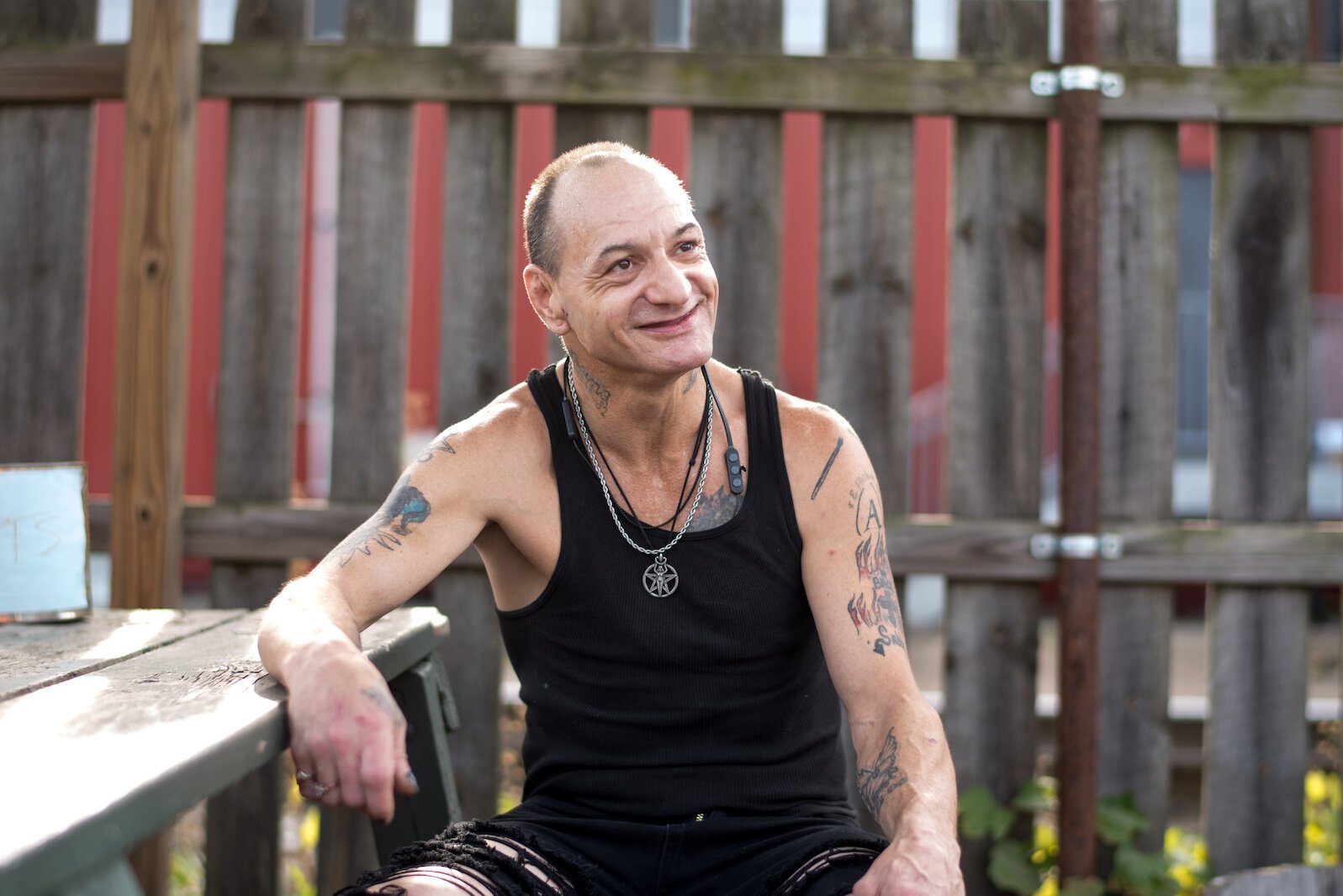
Barrett was discharged, though he could still barely walk. He reunited with Remy who’d been watched by a friend.
Hearing he was alive, Forrest went out looking for him.
Barrett was trying to get out of a car with a “big ol’ sausage leg, man,” he says. “And she’s holding a Slayer T-shirt up, goin’ ‘Hey, you want a shirt?'”
Barrett is a huge metal fan. “I don’t know how she knew, but she listens.”
Forrest points out that Remy has a Slayer dog collar. “You talk about it all the time!” she says.
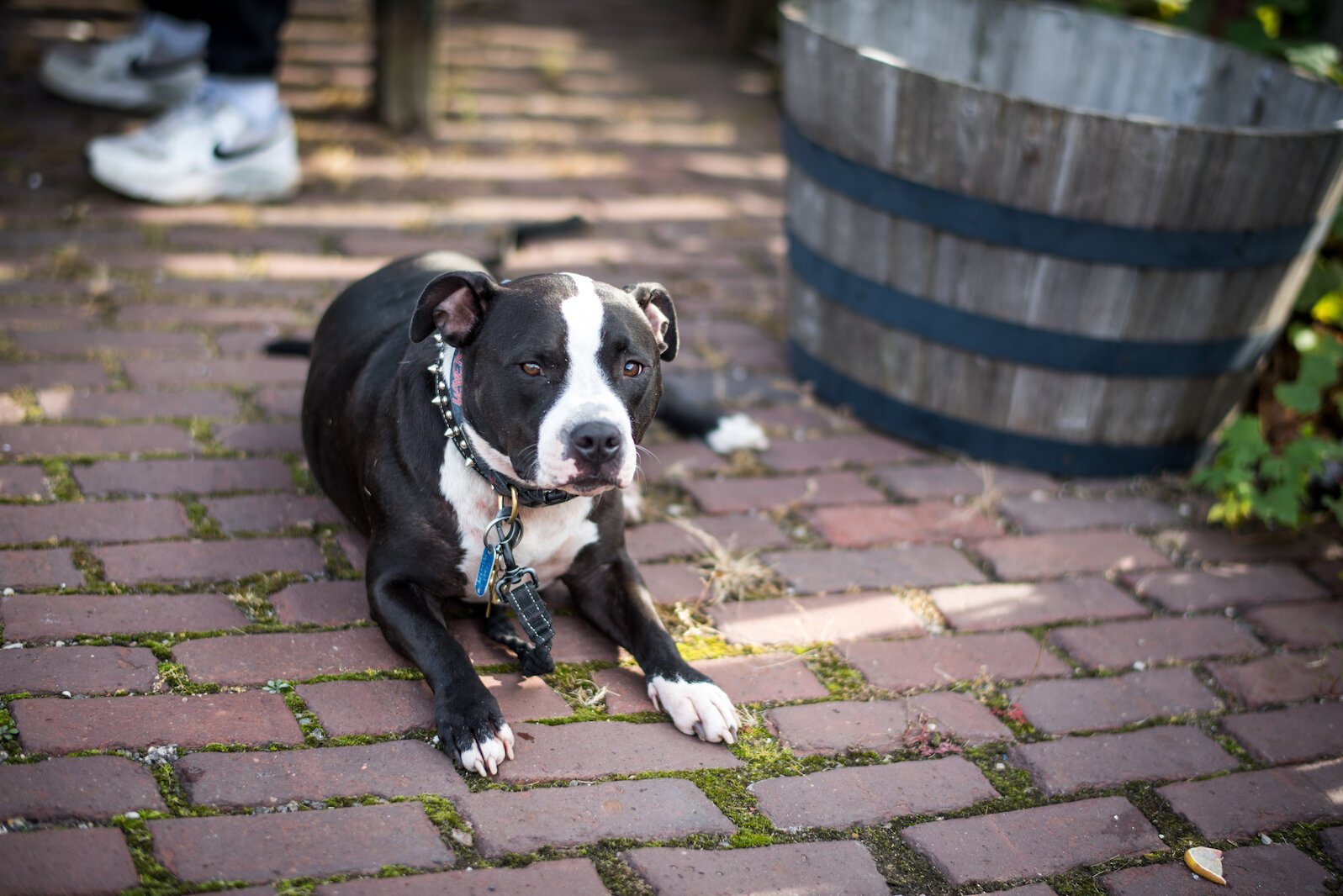
He was recovering — Barrett credits Dr. Sravani Alluri of Street Medicine Kalamazoo with helping him get better. He needed shelter, and tried a bit of couch-surfing. On one cold March night, Forrest drove him around to find a place to stay, and they found nothing. Frustrated, she put him up in a hotel room.
“If it wasn’t for her, I would’ve died,” Barrett says.
Unstable life
Barrett grew up in a house on Lovell, not too far from where he’s living now. “That house still creeps me out. Makes me nervous,” he says.
Barrett has a very open, unfiltered way of speaking. Ask him how he ended up homeless, he starts at the beginning of what was a life of terrible abuse.
“An infant child remembers its first bout of violence,” he says. He remembers a boyfriend of his mother’s beating him in the crib, then throwing him across the room. Barrett shows the scar on his arm where he landed on something sharp and metal.
He shows a star-shaped bullet hole scar where he says his father shot him — the first time. “He shot me, I thought it was an accident. Eight times after that, I wasn’t so sure anymore. I was going hunting with him until I figured out I was the one being hunted.” He laughs. “I make it sound like a joke, but it’s true.”
He was taken from his mother and put in Lakeside Academy for six years. Barrett says he was given an aptitude test that showed he had a high IQ and was accepted for classes at Western Michigan University when he was 14. He studied “sociology, psychology, and early childhood development.”
He’s long had an interest in “what turned innocent kids into monsters like myself. I grew up a waste of human tissue,” Barrett says. “I took what I wanted. I was not a very nice person at all. I was angry, really angry. Abusive angry.”
He had a semester and a half at WMU, but “they deemed the funding wasn’t appropriate, so they cut it. That ended it,” he says. “But I had a pretty good time.”
What he says he learned from his studies of human behavior, from WMU to now, is, “If you’re mean to somebody all the time, you get meanness back.”
He abused himself, and the people around him, he says. He worked at a foundry, was a professional fighter, was in metal bands, but he made the most money as “a cook, for bikers and s—.”
He’s not talking about cooking food? “Methamphetamines,” he clarifies.
Barrett has been in and out of trouble with the law, the latest being when he bought a truck that was suspiciously low-priced. “It was stolen, but I didn’t know HOW stolen!” he says, laughing.
“In and out of prison, because I didn’t want to listen. I was stupid.”
He once had his own place, but that was long ago. Barrett relied on couch surfing for much of his life. “People I could count on, they all died.”
Barrett has three children, two in their 30s and a daughter who just turned 20.
His youngest is the only one he regularly communicates with. She recently told him to live by three rules:
“Always keep your hands in your pockets,” meaning, stop being violent, stop getting into fights, he says.
“Whatever you’re doing, stop,” was her second rule. “I’ve already done that,” he says — that one was about dealing and using drugs.
The third was, “You can’t have a girlfriend unless it’s my mother.”
“But I don’t like your mother,” he says he told her. That’s not a promise he can keep.
Barrett hasn’t been able to form lasting relationships. He never trusted others — until Forrest “offered my dog a coat.”
Walls
“I went from rags to — not riches,” he says. “But I’m spiritually rich.”
Before, Barrett wouldn’t talk to anyone, and he had a constant anger, he says. “Without Meg and other volunteers, their willingness to break the walls that I had put up….” he trails off.
Around when it was thought that Barrett had drowned, Forrest had been working with a few other homeless people, trying to get them housing vouchers, taking them to food banks, etc. “And then I have to drop them off at their tent, and I feel horrible,” she said.
So it seemed right to pay for Barrett’s hotel. And then make herself a familiar voice to local caseworkers.
By that time, Forrest had found that the voucher application process was frustrating for anyone, whether living a stable life or living in a tent. She was learning about the process herself.
She needed to get all proper ID for people, file for pre-application through HRI. Then comes step two, more paperwork to apply for the actual voucher. Pine Grove Housing Service, on the list of MSHDA-approved list of Kalamazoo County housing agencies, was a big help in the second stage, both she and Barrett say.
“They get close to these vouchers, they don’t apply, they don’t understand the vouchers so they don’t fill out the paperwork, they don’t have ID, nobody has the time to help them so they just give up.”
With Barrett, she managed to get the application-to-shelter time down to a little over two months.
Barrett saw the bill at the end of his hotel stay. “I about passed out when I saw what she’d been paying.”
He again expresses his love for Forrest — but it’s platonic, he makes clear. She has a boyfriend, “and I totally respect that,” he says.
Her boyfriend, Eriks Kleinbergs, helped get a surprise for Barrett. When Barrett entered his new home, there were balloons reading “Welcome Home!,” and among them was a full drum kit.
Barrett says he can play any kind of instrument, but he especially loves the drums.
How do his neighbors’ feel about that?
“My neighbors hate me! Because I play better than they do!” he says with a big laugh.
He had musician neighbors he got along with. They moved out, and now there’s a family with loud kids. Their noise can bother him, but he tolerates it because “I was never able to be a kid,” he says.
He again gives credit to Remy, who gave him something to care about. If it wasn’t for her, “I’d be dead under that bridge.”
Then, of course, he sees he’s got “a wonderful support group.”
How could others who’ve been in his situation get help like this?
“I wish there were programs that — oh wait, there are! You just have to go to them! You have to be in them,” he says.
Forrest says she thinks the established organizations meant to help people without homes are unable to provide individual attention, and that organizations try to provide blanket solutions to individuals with very unique problems — addiction, disabilities, trouble with the law, etc.
What’s needed? She points out that Urban Alliance has a program meant to pair homeless people with mentors, to do something like what she’s found herself doing. “Even if people could volunteer and help one person,” she says, then there may be fewer people on the streets.
Barrett just knows he’s got a new life that he can value. He’s been shown “what caring people can do, the power of it,” he says.

